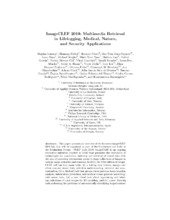ImageCLEF 2019: Multimedia retrieval in lifelogging, medical, nature, and security applications
Ionescu, Bogdan; Müller, Henning; Peteri, Renaud; Dang Nguyen, Duc Tien; Piras, Luca; Riegler, Michael; Tran, Minh Triet; Lux, Mathias; Gurrin, Cathal; Cid, Yashin Dicente; Liauchuk, Vitali; Kovalev, Vassili; Ben Abacha, Asma; Hasan, Sadid A.; Datla, Vivek; Liu, Joey; Demner-Fushman, Dina; Pelka, Obioma; Friedrich, C.; Chamberlain, Jon; Clark, Adrian; de Herrera, Alba Garcia Seco; Garcia, Narciso; Kavallieratou, Ergina; del Blanco, Carlos Roberto; Rodriguez, Carlos Cuevas; Vasillopoulos, Nikos; Karampidis, Konstantinos
Chapter, Peer reviewed, Journal article
Accepted version
Permanent lenke
http://hdl.handle.net/1956/23300Utgivelsesdato
2019Metadata
Vis full innførselSamlinger
Originalversjon
https://doi.org/10.1007/978-3-030-15719-7_40Sammendrag
This paper presents an overview of the foreseen ImageCLEF 2019 lab that will be organized as part of the Conference and Labs of the Evaluation Forum - CLEF Labs 2019. ImageCLEF is an ongoing evaluation initiative (started in 2003) that promotes the evaluation of technologies for annotation, indexing and retrieval of visual data with the aim of providing information access to large collections of images in various usage scenarios and domains. In 2019, the 17th edition of ImageCLEF will run four main tasks: (i) a Lifelog task (videos, images and other sources) about daily activities understanding, retrieval and summarization, (ii) a Medical task that groups three previous tasks (caption analysis, tuberculosis prediction, and medical visual question answering) with newer data, (iii) a new Coral task about segmenting and labeling collections of coral images for 3D modeling, and (iv) a new Security task addressing the problems of automatically identifying forged content and retrieve hidden information. The strong participation, with over 100 research groups registering and 31 submitting results for the tasks in 2018 shows an important interest in this benchmarking campaign and we expect the new tasks to attract at least as many researchers for 2019.
